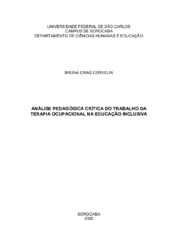Mostrar el registro sencillo del ítem
Análise pedagógica crítica do trabalho da terapia ocupacional na educação inclusiva
| dc.contributor.author | Cervelin, Bruna Eiras | |
| dc.date.accessioned | 2021-01-13T04:21:48Z | |
| dc.date.available | 2021-01-13T04:21:48Z | |
| dc.date.issued | 2020-12-23 | |
| dc.identifier.citation | CERVELIN, Bruna Eiras. Análise pedagógica crítica do trabalho da terapia ocupacional na educação inclusiva. 2020. Trabalho de Conclusão de Curso (Graduação em Pedagogia) – Universidade Federal de São Carlos, Sorocaba, 2020. Disponível em: https://repositorio.ufscar.br/handle/ufscar/13675. | * |
| dc.identifier.uri | https://repositorio.ufscar.br/handle/ufscar/13675 | |
| dc.description.abstract | The present work sought to understand the extent to which Freire's pedagogy can contribute to the praxis of occupational therapy to overcome limits and difficulties experienced in the educational practice of a critical inclusion in the society of students target audience of special education. For this, a qualitative research was carried out through document analysis and critical discourse analysis. The theoretical framework of Paulo Freire and Latin American occupational therapists such as Galheigo stands out. Two documents were selected, a WFOT positioning statement called “Occupational Therapy Services in School Practice for Children and Youth” and the “Latin American Manifesto of Occupational Therapy and Occupation”, and their relationship with the Freireano concept of authentic praxis. The WFOT document, in spite of covering concepts from the biopsychosocial perspective and promoting practice based on occupation tends to be hegemonic, where it is up to the occupational therapist to contribute so that the student can perform and participate in the activities of the school routine. The manifesto, on the other hand, despite not mentioning issues related to education directly, proposes a call to occupational therapists to rethink their practices in a critical perspective, where inclusion does not mean adapting individuals so that they fit into specific occupations for the maintenance of the status quo and that end up contributing to exclusion even if unintentionally. We conclude that Freire's pedagogy contributes significantly to occupational therapy, helping for a critical reflection of professional performance. Southern occupational therapy was born in the field of social occupational therapy and it is more in touch with it. The field of education, however, still lacks publications on the subject. | por |
| dc.description.sponsorship | Não recebi financiamento | por |
| dc.language.iso | por | por |
| dc.publisher | Universidade Federal de São Carlos | por |
| dc.rights | Attribution-NonCommercial-NoDerivs 3.0 Brazil | * |
| dc.rights.uri | http://creativecommons.org/licenses/by-nc-nd/3.0/br/ | * |
| dc.subject | terapia ocupacional do sul | por |
| dc.subject | Paulo Freire | por |
| dc.subject | educação inclusiva | por |
| dc.title | Análise pedagógica crítica do trabalho da terapia ocupacional na educação inclusiva | por |
| dc.title.alternative | Critical pedagogical analysis of occupational therapy work in inclusive education | eng |
| dc.type | TCC | por |
| dc.contributor.advisor1 | Silva, Antonio Fernando Gouvêa da | |
| dc.contributor.advisor1Lattes | http://lattes.cnpq.br/9621931288117213 | por |
| dc.description.resumo | O presente trabalho buscou compreender em que medida a pedagogia freireana pode contribuir com a práxis da terapia ocupacional para a superação de limites e dificuldades vivenciadas na prática educativa de uma inclusão crítica na sociedade dos alunos público alvo da educação especial. Para isso foi realizada uma pesquisa qualitativa através de análise documental e análise crítica do discurso. Destaca-se o referencial teórico de Paulo Freire e de terapeutas ocupacionais latino-americanos como Galheigo. Foram selecionados dois documentos, sendo uma declaração de posicionamento da WFOT denominada “Serviços de Terapia Ocupacional na Prática Escolar de Crianças e Jovens” e o “Manifesto Latino-Americano de Terapia Ocupacional e Ocupação”, e analisado a relação destes com o conceito freireano de práxis autêntica. O documento da WFOT, apesar de abranger conceitos na perspectiva biopsicossocial e fomentar a prática baseada na ocupação, tende a ser hegemônica, onde cabe ao terapeuta ocupacional contribuir para que o estudante consiga realizar e participar das atividades da rotina escolar. O manifesto, por outro lado, apesar não mencionar questões relativas à educação diretamente, propõe um chamado aos terapeutas ocupacionais para repensarem suas práticas numa perspectiva crítica, onde a inclusão não significa adequar os indivíduos para que estes se encaixem em ocupações determinadas para a manutenção do status quo e que acabam por contribuir com a exclusão mesmo que de forma não intencional. Concluímos que a pedagogia freireana contribui significativamente com a terapia ocupacional, auxiliando para uma reflexão crítica da atuação profissional. A terapia ocupacional do sul nasceu no campo da terapia ocupacional social e nela encontra-se mais aflorada. Já o campo da educação, ainda carece de publicações sobre a temática. | por |
| dc.publisher.initials | UFSCar | por |
| dc.subject.cnpq | CIENCIAS HUMANAS::EDUCACAO::TOPICOS ESPECIFICOS DE EDUCACAO | por |
| dc.publisher.address | Câmpus Sorocaba | por |
| dc.contributor.authorlattes | http://lattes.cnpq.br/4621475943945841 | por |
| dc.publisher.course | Pedagogia - PedL-So | por |

